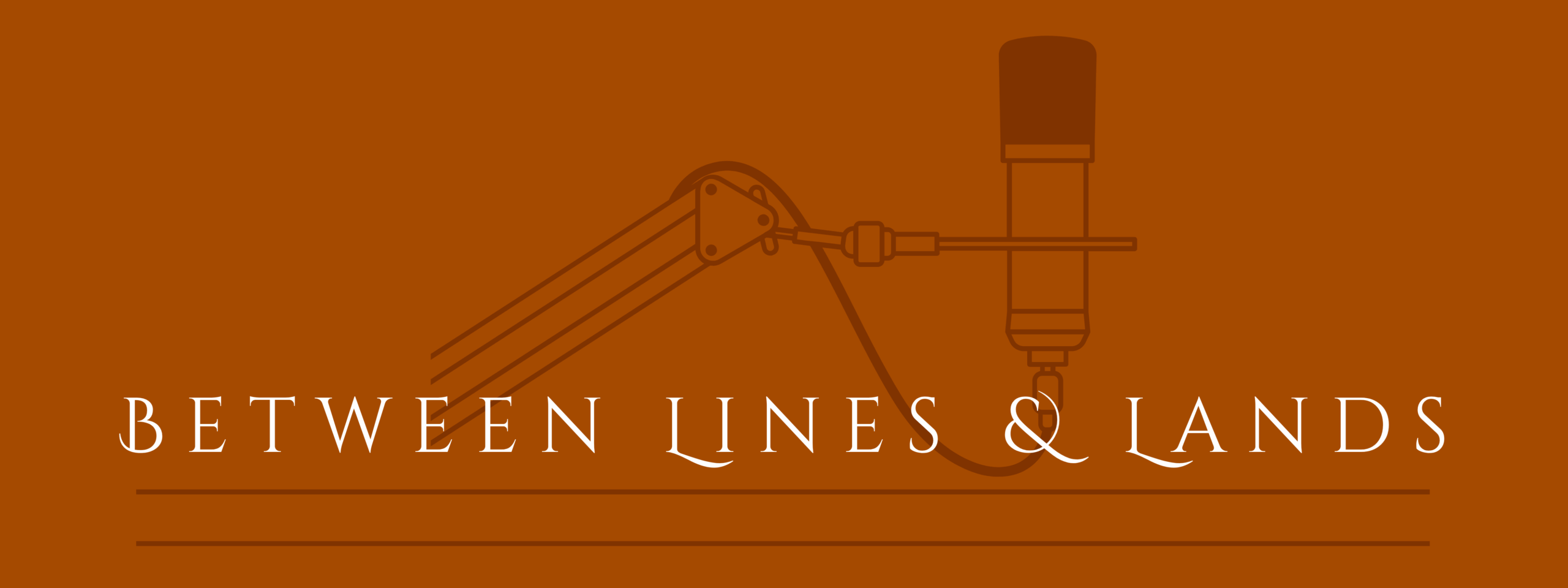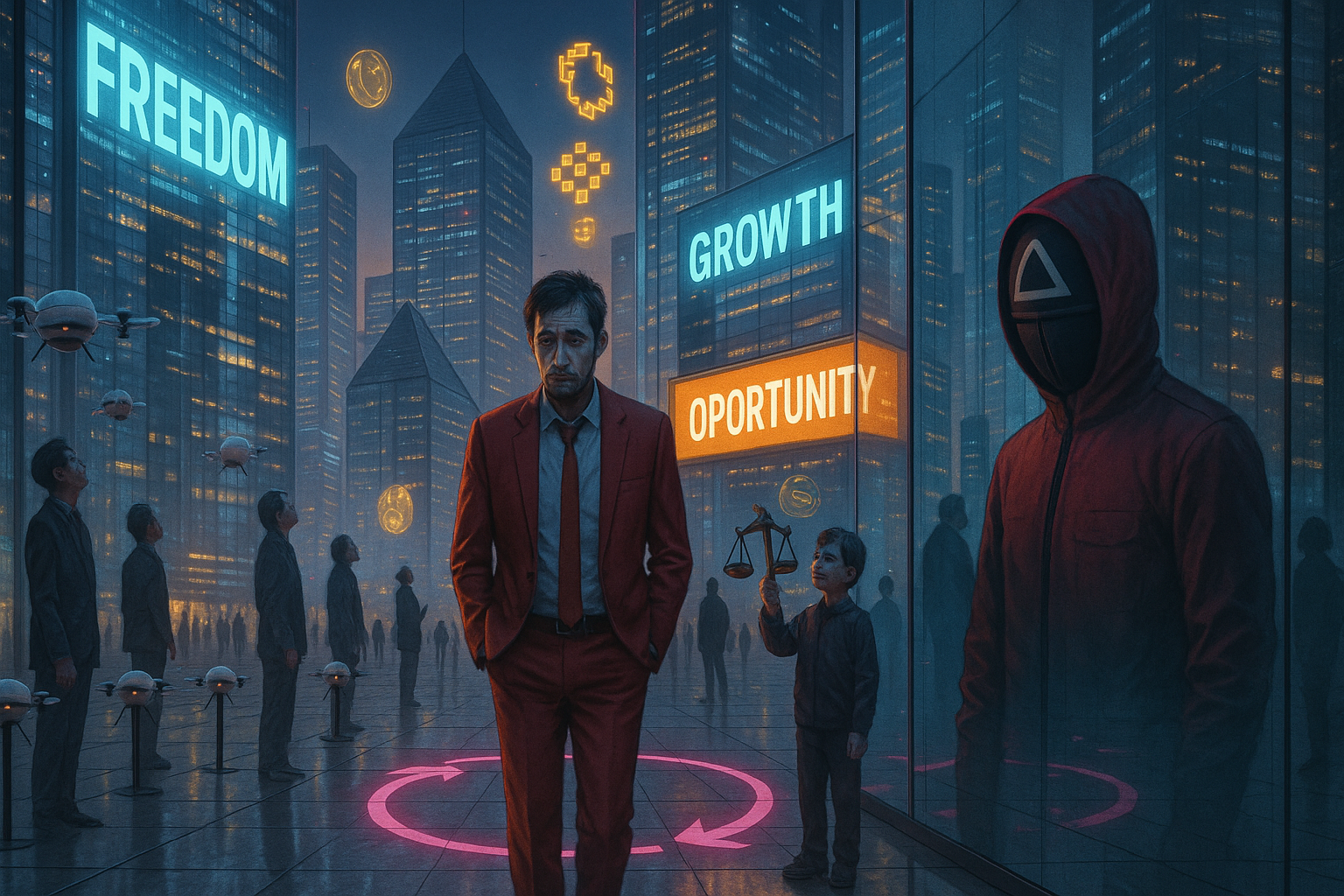By Shakil Ahmad
(Part 2 of 3 in the series: The Game Is Rigged)
“You still want to play this game… even after you’ve seen what it really is.”
— Squid Game, Season 2
🚪 When Knowing Isn’t Enough
Season 1 of Squid Game ends with a brutal realization: the game is rigged, the powerful write the rules, and the illusion of freedom is the bait.
But Season 2 raises an even more uncomfortable question:
What happens when people know the truth… and still come back?
Gi-hun knows. He’s seen every corner of the game. He’s won. And yet, he can’t leave it behind. Neither can the new players — many of whom return with full knowledge of the horror. This is no longer ignorance. It’s something more haunting: belief in a system they know will break them.
Why? Because the game has evolved. Not in form — but in function.
Now it doesn’t need to hide. It needs you to believe it’s fair.
This isn’t just a plot twist. It’s an economic parable.
And like in Part 1 of this series, we’ll again hold this story up against the work of economist Ha-Joon Chang, particularly his 23 Things They Don’t Tell You About Capitalism — a book that tells us plainly:
“What feels like freedom is often just a well-designed illusion.”
🧵 When Truth Becomes Powerless
One of the most devastating scenes in Season 2 is when Gi-hun, now a former winner, tries to warn the new players:
“I’ve played this before. It’s not what you think. You won’t make it out.”
But they ignore him. Some mock him. Others accuse him of lying for his own gain.
This moment is a metaphor for how powerless truth becomes once belief takes over. When people have been trained to equate risk with opportunity, anyone who speaks against it sounds like a coward or a traitor.
This is what happens in the real world, too:
- Whistleblowers are dismissed as bitter.
- Economic critics are branded as negative.
- Lived experience is erased by glossy marketing.
As Ha-Joon Chang writes in Thing 2:
“Companies don’t just sell products. They sell belief.”
And once that belief is installed, truth has no traction.
🎮 The Illusion of Rational Choice and the Moving Goalpost
Season 2 begins with a moment of supposed liberation — a vote to end the game, democratically. Players believe they’re free. But the illusion doesn’t last. New games are proposed. New rounds are framed as optional. And one by one, players return.
Why?
Because they’re convinced that this time, they know better.
Because the prize feels closer.
Because surviving once makes the danger feel manageable.
We watch one of the most heartbreaking arcs unfold: a son convinces his mother to stay. He believes — genuinely — that he’s doing what’s best for both of them. But he’s not. He’s repeating the cycle. He’s fallen into the trap of moving goalposts, where every rational choice is a step deeper into destruction.
This is not fiction. This is modern life:
- Middle-class workers spending their lives chasing a retirement that keeps getting pushed back.
- Students taking on debt believing the degree will pay off — while the job market crumbles.
- Families choosing between insulin and rent, still told “you’re free to choose.”
The game continues. The stakes remain deadly. And the only ones who consistently benefit?
The makers of the game.
🧊 The Corruption of the Victors
Gi-hun’s journey in Season 2 isn’t redemptive — it’s tragic.
He won, but he’s not free. His money feels radioactive. His relationships have eroded. He has no peace. He’s been given everything he thought he wanted, but he’s lost the ability to want.
Even worse? The show reveals the origin of the Front Man — a past winner turned enforcer. A former victim now guarding the system.
This is not just drama. It’s pattern.
In real life:
- Poor kids who make it into elite spaces often become defenders of that exclusivity.
- Refugees who survive start supporting border control.
- Marginalized individuals who climb the ladder often help pull it up behind them.
Capitalism doesn’t just reward victory. It rewards forgetting.
Thing 12 puts it plainly:
“Governments have always picked winners — they just pretend not to.”
And when you become one of those winners, you’re invited to play a different role: protector of the illusion.
🔄 The Myth of Rational Redemption
Many characters in Season 2 believe they’re making “better” decisions. They talk strategy, alliances, probabilities. Gi-hun thinks knowledge gives him control. Others try to game the system more efficiently.
But none of it matters. Because the structure hasn’t changed.
The rules still demand betrayal.
The outcomes still punish trust.
And the goal — one winner — still ensures everyone else must lose.
This is the central lie of the free market:
“If you just play smart, you’ll get ahead.”
But the game isn’t about smart. It’s about staying silent. Staying cruel.
Choosing self-preservation over solidarity.
In one haunting episode, players are given a moral choice:
Betray a friend or face elimination.
And they do it. Not because they’re evil, but because cruelty has been made to feel rational.
As Ha-Joon Chang reminds us in Thing 14:
“Markets reward behavior that fits the game, not necessarily what is right.”
🚪 The Market Has No Exit
The biggest twist in Season 2 isn’t inside the game — it’s outside of it.
Gi-hun walks through glittering malls and polished airports, but the rules haven’t changed. The game still follows him — in humiliation, in decisions shaped by fear, in systems built for someone else’s benefit.
The Squid Game is no longer confined to a secret island.
It’s everywhere.
That’s the show’s most powerful claim:
The system doesn’t need you to die. It needs you to keep playing.
And if you win? Even better. Because then you’ll defend it.
You’ll say it was fair. You’ll say it gave you a chance.
You’ll say others just didn’t try hard enough.
That’s how modern capitalism sustains itself.
Not through force — but through faith.
🎧 Between Lines and Lands — The Conversation Continues
This blog post is part of a series that parallels Squid Game with the uncomfortable truths exposed by Ha-Joon Chang in 23 Things They Don’t Tell You About Capitalism.
In our podcast Between Lines and Lands, we take these cultural moments and connect them to the systems we live in — one book, one conversation at a time.
Because questioning the game is the first step toward refusing to play it blindly.
✍️ Coming Up Next: The Loyalty of the Broken
In Part 3, we’ll turn to Squid Game Season 3 — where we explore what happens when the game no longer needs to lie, because its winners become its loudest defenders.
We’ll ask:
Can you escape a system if you benefit from it?
And what happens to morality when memory is overwritten by privilege?
🎧 Follow the Journey:
🔗 Instagram: @linesandlands
🔗 YouTube: Between Lines and Lands
🔗 TikTok: @linesandlands

